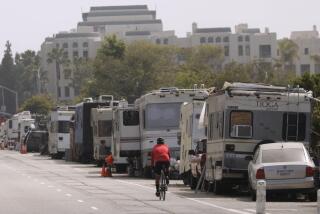Decision on Rezoning Trailer Park Delayed
The Costa Mesa City Council postponed action Monday on a proposal by mobile-home residents to rezone their trailer park to protect it from potential development.
“We couldn’t do that tonight,” Mayor Peter F. Buffa told the 60 or so residents of the Regal Club mobile-home park who attended the meeting.
Buffa explained that the city doesn’t have a mobile-home park zoning designation. And even if there were such a designation, Buffa said, only the property owner could seek a zoning change.
The 20-year-old park, at 18th Street and Monrovia Avenue, is part of a trust run by Wells Fargo Bank, which is opposed to the zoning change because it would limit its options on the land, said Vickie Talley, executive director of the Anaheim-based Manufactured Housing Educational Trust, speaking on behalf of Wells Fargo.
However, Talley said, the bank recently extended its lease with the park operator until 1994 and has no immediate plans to change the park’s use.
The park residents say the change is needed to protect their homes against rent increases and displacement by developers.
Most of the park’s residents are senior citizens on fixed incomes who say they cannot afford spiraling rents that already average $400 a month.
“There is development going on all the time, and we are already surrounded by a concrete jungle,” said Robert Singer, president of the Regal Club. “With the zoning change, we could ensure we would remain a mobile-home park.”
In a survey of the park’s 94 homeowners, more than 90% favored the zoning change, Singer said.
Gerald R. Gibbs, an attorney for the park residents, said he would encourage city staff to research creating a mobile-home park zone, especially since Costa Mesa is reviewing its General Plan next month.
With a zoning classification specifically for mobile-home parks, the property owner would have to seek a zoning change rather than a conditional-use permit to use the land differently.
Under city laws, the council can reject a zoning change without citing specific reasons, whereas application for a conditional-use permit leaves the council much less discretion over how the land can be used.
Proponents of the zoning change say the difference will make owners less likely to sell their parks to developers.
But representatives of mobile-home park owners argue that creating a special zoning classification unfairly limits an owner’s right to develop property, thereby depressing its value.
In 1986, the council rejected a similar proposal to place all of the city’s mobile-home parks in a special zone.
The mobile-home residents are also considering a plan to purchase the 9.5-acre park under a state law that offers qualified mobile-home park dwellers special loans to cover the down payment. Under the law, payments are suspended until the title on a parcel changes hands.
More to Read
Sign up for Essential California
The most important California stories and recommendations in your inbox every morning.
You may occasionally receive promotional content from the Los Angeles Times.











